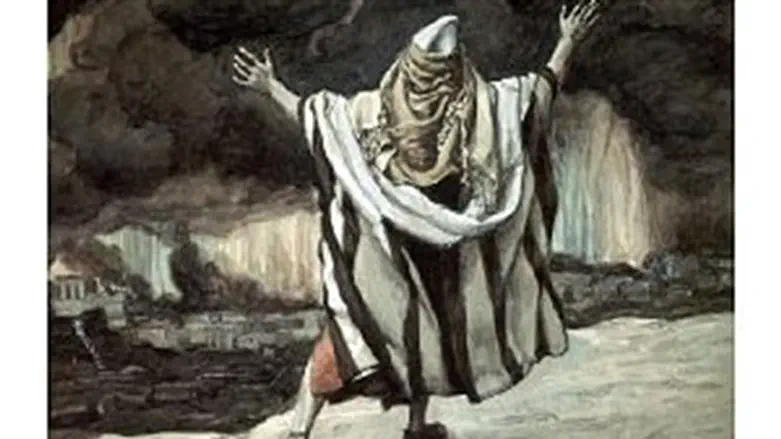
Rav Chaim of Chernowitz notes a difficulty in the order of these psukim:’As it opens with Hashem telling Avraham of the judgement of destruction hanging over Sodom and Gemorrah, it should have then immediately related Avraham‘s response to the dire tidings Hashem had just shared with him.
‘Why does the Torah instead ‘interrupt‘ to relate that:’The men had turned there and went to Sodom’-and only then related Avraham’s response to the tidings?’
Answers the Rav:‘Our Sages say:’Even if the sharp edge of a sword, is against a person’s neck, he should not despair of Hashem’s mercy’. With this in mind, even after Avraham had heard the dire news from Hashem, and had seen that the emissaries to carry out the decree against Sodom, had departed to carry out their mission, Avraham still prayed to Hashem, to save the people of Sodom.
‘This is the meaning of:’And the men had turned from there, and went towards Sodom’- they being the emissaries of destruction- ‘Avraham was still standing before Hashem; ויגש: and he approached Hashem, in prayer, to plead, for the people of Sodom, as related at length, in the following psukim’.
Rav Eliyahu Dessler wonders :’Avraham knew of the wickedness of the people of Sodom; their ways were the very opposite of his ways of chesed and compassion.
‘If they were allowed to remain alive, they would surely continue to transgress, and therefore, seemingly Avraham’s pleas on their behalf, were a chillul Hashem.
‘Even if there were found to be ten righteous people in the city, the wicked were unlikely to all repent, and would likely number in the hundreds and thousands’.
How, then, could he plead that they be spared?
Answers Rav Ahron Kotler:’From Avraham Avinu’s pleading for the wicked people of Sodom, we learn the extent of the obligation to pray for others- even for those whose ways were so abhorrent in his eyes, he nevertheless spared no effort to plead for their lives, even being מוסר מפש, to risk Hashem’s wrath, by so doing’.
The Kli Yakar sweetens our appreciation of this wondrous episode.
He notes that our Parsha opens with Hashem ‘appearing’ to Avraham Avinu, but not speaking to him-Why?:‘Because the purpose of this ‘appearance’ was to teach him of the wickedness of the people of Sodom.
‘This is why we immediately then read of the miraculous coming of the three way-farers, for whom Avraham Avinu then performs his peerless הכנסת אורחים: hospitality, ‘That’, says the Kli Yakar, ‘was so that he will agree with Hashem that Sodom merits destruction, for their total opposition to visitors- as it was known to Hashem that when these same way-farers on their subsequent arrival in Sodom, would be denied hospitality.
‘Therefore, Avraham would know that בדין: they rightly merited destruction’.
But to no avail, as Avraham Avinu’s love of chesed, still compelled him to plead with all his heart, that the people of Sodom be spared.
The Belzer Rebbe, Rebbe Yehoshua Rokeach, offers a beautiful insight into a different intriguing aspect, on the psukim:We read (18:17):’And Hashem said:’Shall I conceal from Avraham that which I an going to do’ to Sodom, ‘AND Avraham is surely to become a great and mighty nation’.
Asks the Rebbe:’What connection is there between these two psukim- between ‘Avraham going to be a great nation’ , and whether Hashem should reveal to him the intended destruction of Sodom and Gemorrah?’.
He answers:’Because, as we read, Avraham, on hearing of this decree, pleaded strenuously for them, yet his prayers were not accepted.
‘Therefore, we might think that perhaps it would be better that he not be informed, and so be ‘spared’ all those prayers which would go unanswered.
‘However, we learn in our holy tomes, that even though a prayer of a Jew is not immediately answered, it is stored by Hashem in His treasury, and if, at some future time, the Jew or his descendants are in need of the same relief, and are themselves unable to pray for it, then Hashem will ‘awaken’ that prayer, and treat his descendants mercifully.
‘This is the deeper meaning of the pasuk:’And Avraham shall be a great and mighty nation’: True, there is a side to concealing from Avraham that which Hashem has decreed for Sodom and Gemorrah, and that is that his prayers for them, will not be accepted.
‘However, I, Hashem, will not conceal from Avraham the decree on those people, as his prayers for them will not be in vain; as ‘Avraham will be a great and mighty people’, and his prayers, though unanswered now, will bring relief and be answered for his generations, in their hour of need’.
And when was this?
Answers Rav Pinchas Friedman:’In Egypt, when the enslaved Bnei Israel were unable to pray, and could only ‘cry out’. Hashem then drew upon these ‘unanswered’ prayers of Avraham to save His people, the descendants of Avraham, from their enslavement in Egypt’.
A parting thought from Rav Kotler:’From Avraham Avinu’s tireless prayers for the wicked people of Sodom and Gemorrah, we learn how great is our obligation to pray for our people- for the כלל and for the individual!’.
Shabbat Shalom.
לרפואת נועם עליזה בת זהבה רבקה ונחום אלימלך רפאל בן זהבה רבקה, בתוך שאר חולי עמנו.